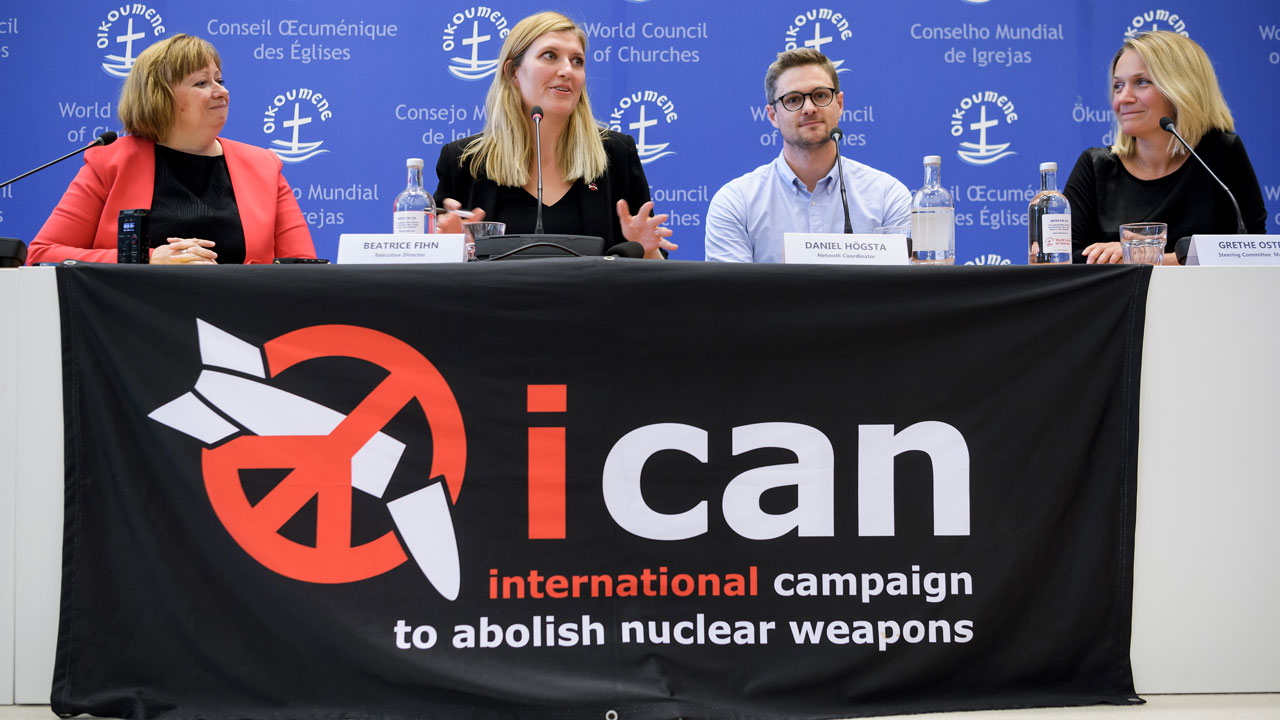
The Nobel committee spurned an opportunity to celebrate the Iran nuclear deal, but still found a way to send a message to US President Donald Trump.
Trump is a stern critic of the 2015 accord, and US officials say that he intends to tell the US Congress next week that Tehran is not honoring its side of the bargain.
He is also engaged in a perilous game of brinksmanship with nuclear-armed North Korea, threatening “fire and fury” and exchanging insults with young dictator Kim Jong-Un.
Some supporters of the deal had hoped the jury would honor the architects of the Iran deal and in doing so send a message to Trump about the power of diplomacy.
In the end the committee chose not to provoke Trump by handing prizes to Iran’s Foreign Minister Mohammad Javad Zarif or former US secretary of state John Kerry.
But in celebrating the International Campaign to Abolish Nuclear Weapons (ICAN) they sent a strong message about the world’s concerns about nuclear escalation.
“The message that has been communicated is a more subtle indirect messaging,” said Melissa Dalton, a senior fellow at the Center for Strategic and International Studies.
“It’s potentially a message and an encouragement to uphold the JCPOA as a commitment that the US has made with allies to non-proliferation,” she said, referring to the Iran deal.
ICAN is a global civil society movement pushing for a global treaty to ban nuclear arms, one that was signed by 122 countries — although none with such weapons — in July.
Speaking in Geneva, ICAN head Beatrice Fihn made an explicit link between the award and concerns about Trump’s attitude to the Iran deal and non-proliferation efforts.
Next week, Trump is expected to announce he is “decertifying” Iran’s compliance with the 2015 agreement it signed to limit its nuclear program in exchange for sanctions relief.
Officials insist that this will not sink the deal itself but open the way for Congress to possibly develop new measures to punish other aspects of Iran’s behavior.
Global opinion
Trump has called the deal an “embarrassment to the United States” but rather than scrap it he is exploring a risky middle path to turn up the pressure on Iran.
Ever scornful of the record of his Nobel laureate predecessor Barack Obama, the US leader is unlikely at this stage to be influenced by a Norwegian committee.
But the timing of the award underlines the extent to which his hostility to the pact is out of step with global opinion, including with US allies in Europe.
And even if, as is now expected, the accord survives Trump’s Washington maneuvers, his position may have weakened his ability to negotiate with another foe: North Korea.
The US strategy to deal with Kim’s nuclear bravado is to use sanctions and diplomacy — backed by a credible military posture — to bring him to the negotiating table.
But doubts hanging over the Iran deal make success less likely, say observers, including Jung Pak of the Center for East Asia Policy Studies at the Brookings Institution.
“Even if North Korea and the US came to an agreement, Kim has no reason to think that an agreement would stick from one US administration to the next,” he warned.
“Given Trump’s sharp criticism and talk of reneging on the Iran nuclear deal, the message is loud and clear, the US cannot be trusted.”
Washington’s European allies are also nervous that Trump’s criticism of the deal will encourage US hardliners to undermine the entire agreement.
“We told the administration: certification or not, that’s not our problem, this is an American domestic issue,” one Western diplomat told reporters.
“But beware of a demarche that would endanger the agreement. Our concern now is what the Congress will do if Trump doesn’t certify,” he said.
There are some hawks in Washington who will seize on any opportunity to toughen the US stance — despite the international solidarity symbolized by the Nobel award.
Influential conservative Senator Tom Cotton is known to have Trump’s ear and he advises pushing ahead with both decertification and new sanctions.
“If anything, certifying the disastrous deal with Iran will show the North Koreans that we lack the will to confront them,” he said, arguing that Kim would respect a strong stance.
“Isn’t it curious that North Korea’s nuclear and missile tests have accelerated so rapidly since we agreed to the Iran deal?”



